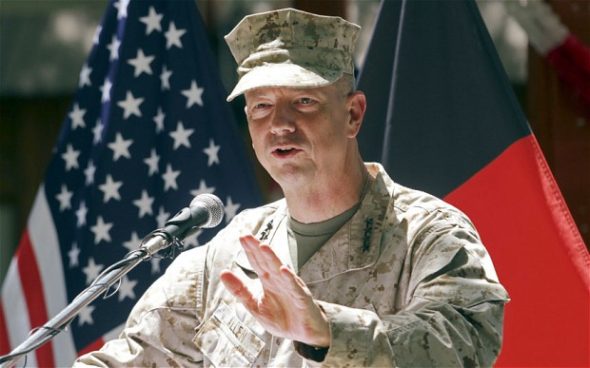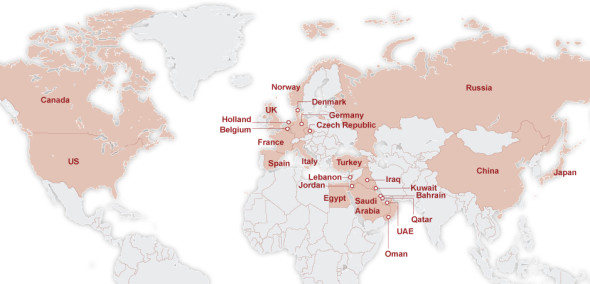Gen John Allen will lead new global coalition to crush Islamic State
Daily News Article — Posted on September 17, 2014
Note: The terrorist group that President Obama says he will target is known by several names:
- Islamic State (IS)
- Islamic State in Iraq and Syria (ISIS)
- Islamic State of Iraq and the Levant (ISIL or Isil)
(by Philip Sherwell, Daily Telegraph) – The retired U.S. general given the task of leading a large, diverse and unwieldy international coalition against ISIS extremists is no stranger to the volatile complexities of the region.
John Allen, 60, a former chief of NATO forces in Afghanistan and commander of U.S. troops in western Iraq, is a respected military thinker, both cerebral and hawkish, who has urged President Barack Obama to “eradicate” ISIS. (Eradicate is to eliminate or destroy something completely)

Gen. John Allen, who was appointed by President Obama to be the State Department’s “Special Presidential Envoy for the Global Coalition to Counter Isil [ISIS]”
Their meeting came the day after at least 27 countries declared their resolve to defeat the terror group at a conference in Paris on Monday. Gen. Allen’s new role is to mould that global grouping into an effective coalition.
The U.S. just launched fresh bombing raids on ISIS positions in northern Iraq and, for the first time, near the capital Baghdad. But Gen. Allen had already outlined his calls for an all-out assault on the terrorist faction that has seized swathes of Syria and Iraq in a commentary last month.
“The Islamic State (IS) is an entity beyond the pale of humanity and it must be eradicated,” he wrote for the Defense One website last month. “If we delay now, we will pay later.
“Make no mistake, the abomination of IS is a clear and present danger to the US. The only question really is whether the US and its allies and partners will act decisively now while they can still shape events to destroy IS, an act that seems increasingly self-obvious.”
Gen. Allen led the NATO mission in Afghanistan from 2011 to 2013, a role that required him to handle the famously unpredictable Afghan president Hamid Karzai as well as command forces from dozens of countries during the withdrawal of troops.
He previously served as deputy chief of US Central Command that oversees US military operations in the Middle East – a role that gave him strong connections with military and intelligence officials in the region.

Twenty-seven countries have offered support to a US-built coalition to fight Isil in Iraq and Syria, but most have been vague about what role they might play. This map shows the countries that met Monday, Sept. 15, in France. (Image: The Telegraph)
And he was praised for his counter-insurgency work as he built relationships with Sunni tribes during the “Awakening” movement when he was the US commander in the troubled Anbar province from 2006 to 2008.
Now he faces a major new challenge as he seeks a balancing act with the coalition that may reach more than 40 countries assembled by the US. They may share a stake in defeating Isil [ISIS], but many have other competing interests.
Mr. Obama had made clear in his address to the nation last week that he believes forging an international coalition incorporating Arab and Muslim states was crucial to the anti-Isil [anti-ISIS] strategy of Washington and its Western allies. One of Gen. Allen’s first tasks will be to obtain specific commitments from those coalition members.
The White House and Pentagon have said that the Washington now “at war” with ISIS, but this time there is no plan for the general command American fighting forces as the president has been at pains to insist there will be no US “boots on the ground.”
Frederick Hof, the former State Department special envoy on Syria, praised the appointment as “the best indication yet that the Obama administration takes this undertaking seriously and intends to see it through.”
Mr. Hof, a senior fellow at the Rafik Hariri Centre for the Middle East at the Atlantic Council think-tank, told The Telegraph: “Allen was an extraordinarily effective Marine officer. He knows the business of combat, and has genuine political-diplomatic skills: his record in Iraq and Afghanistan speaks for itself.
“His appointment is a good indication that this operation will not be micromanaged by the White House and will be something far beyond an exercise in strategic communication. It should be very well-received by regional partners of the US and its transatlantic allies.”
President Obama is a long-standing champion of Gen Allen. Indeed, the president asked the general to serve as NATO’s Supreme Allied Commander in 2013, but the nomination was put on hold after he found himself entangled in a scandal over embarrassing emails that he exchanged with a Florida socialite.
A Pentagon investigation subsequently found no evidence of an affair between the two and cleared him of any wrongdoing, despite “inappropriate” language in the messages.
But the general then told the president that he was retiring from the military and withdrawing his name from the running for the NATO job for personal reasons, citing the health of his wife of 35 years, Kathy.
After his retirement, he took up teaching positions and worked as an advisor to both Chuck Hagel, the defence secretary, and John Kerry, the secretary of state, developing a security plan for the West Bank during Middle East peace talks.
Prominent Republicans who are long-time critics of Mr Obama have spoken positively about the appointment. But in the Middle East, it is that very US military track record that is prompting some disquiet.
“My concerns are that the areas of Allen’s expertise and experience in recent years raise many doubts about American [effectiveness] in the Arab-Asian region, instead of inspiring confidence,” wrote Middle East commentator Rami Khouri in his column in the Daily Star in Lebanon. …
Gen Allen meanwhile was in no doubt about the dangers posed by Isil not just to the US but the world, even before US intelligence chiefs last week increased their estimate of the group’s fighting strength ranks to between 20,000 and 31,500 – doubling previous estimates.
In his commentary for Defense One, he wrote that the US remained the only country capable of exerting the kind of strategic leadership, influence and strike capacity to deal with Isil.
“It is also the only power capable of organizing a coalitions reaction to this regional and international threat,” said Gen Allen. “As a general officer commanding at several levels in the region, I can say with certainty that what were facing in northern Iraq is only partly a crisis about Iraq. It is about the region and potentially the world as we know it.”
Reprinted here from London’s Daily Telegraph for educational purposes only. May not be reproduced on other websites without permission from the Daily Telegraph.
Questions
1. What qualifications does retired U.S. general John Allen have that make him a good choice for the “Special Presidential Envoy for the Global Coalition to Counter Isil [ISIS]”? Be specific.
2. What is the role of this new position President Obama has created?
3. In a commentary he wrote last month, Gen. Allen already outlined what needs to be done to wipe out ISIS. What recommendation/warning did Gen. Allen make about ISIS in his commentary?
4. What challenges does Gen. Allen face in getting the countries opposed to ISIS to agree on what steps to take to destroy these terrorists? (Representative from almost 30 countries met - what challenge does he face getting them to act?)
5. How does Frederick Hof, former State Department special envoy on Syria view Gen. Allen’s appointment?
6. How do Democrats and Republicans view Gen. Allen’s appointment?
CHALLENGE: Read Gen. Allen’s commentary at: studentnewsdaily.com/editorials-for-students/destroy-isis-now/ and answer the questions below the article.
Background
Efforts to Fight Against Islamic State in Syria and Iraq, are Hampered by Arab Divide:
- U.S. efforts to build a broad coalition to combat Islamic State on Monday ran straight into the sectarian chasm that has divided the Middle East for centuries, with Arab allies disagreeing over whether Iraq's neighbors - particularly Iran and Syria - should have a role in any military campaign.
- A group of 26 countries gathering in Paris - including the U.S., Saudi Arabia and Russia - vowed to back the fight against the Sunni extremist organization "by any means necessary, including appropriate military assistance."
- But a day after the U.S. said Arab states were willing to participate in airstrikes, Arab countries attending the Paris meeting gave no sign they were ready to join the military campaign. The U.S. also faced criticism from Russia, Syria's top international ally, which insisted airstrikes on Syria must be coordinated with Damascus and Tehran.
- The hesitancy of many of the Middle East's major Sunni leaders, including in Saudi Arabia, Jordan and the United Arab Emirates, to back military operations is driven, in part, by a belief American airstrikes against the Islamic State will benefit the region's three main Shiite-dominated governments in Iran, Iraq and Syria, according to U.S. and Arab officials involved in the deliberations.
- That debate highlighted how the Obama administration's plans to lead the international coalition against Islamic State have plunged it more deeply into a regional feud between Sunni and Shiite states.
- Sensitive to Sunni Arab states' concerns, Secretary of State John Kerry and other U.S. officials have publicly ruled out in recent days cooperating militarily with Tehran and Damascus in rooting out Islamic State, though Washington acknowledged private discussions have been held with Iran's rulers.
- Such a stance raises the possibility that Iran's Islamist rulers and Syrian President Bashar al-Assad's regime could attempt to sabotage U.S. military operations, as they did in Iraq in the years following the George W. Bush administration's overthrow of Saddam Hussein in 2003.
- In recent days, leaders of Iraqi Shiite militias close to Tehran, including Kata'b Hezbollah and the Mahdi Army, have publicly warned Washington that U.S. soldiers could be targeted if the White House pushes ahead with its military offensive against Islamic State, also known as ISIS or ISIL.
- "If you come back, we will be back too," radical Shiite cleric Moqtada al-Sadr, who commands the Mahdi Army, said in a televised statement Monday.
- Iran's Supreme Leader Ayatollah Ali Khamenei put the Obama administration on the defensive ahead of the talks by publicly claiming his government has rejected numerous overtures from Washington to jointly cooperate against Islamic State.
- Iraq's new leaders reprimanded the U.S. and its European and Arab allies for not inviting Iran to attend the Paris conference.
- "We had insisted for Iran to be there and we regret their absence," Iraqi Foreign Minister Ibrahim al-Jaafari said in Paris, adding that Tehran had provided his government with "significant support" in fighting Islamic State. (from wsj.com)
